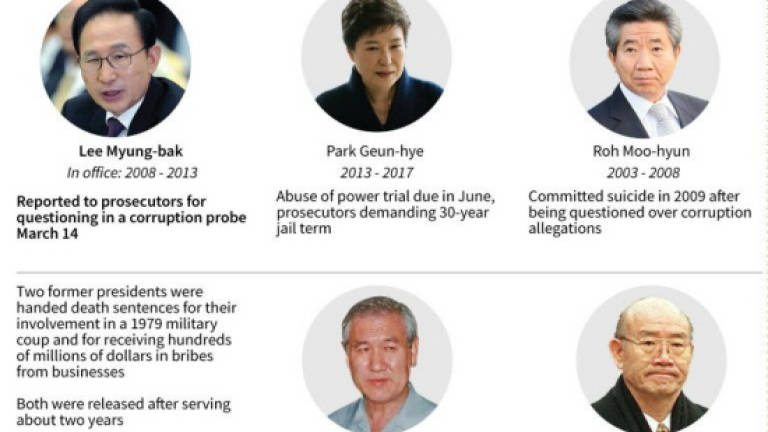Blue House to jail house: South Korea's criminal precedents

SEOUL: Most South Korean presidents of recent decades have had their retirements interrupted — or terminated — by legal troubles.
In fact, every living former occupant of the presidential Blue House has been convicted, charged or investigated for criminal offences. One ex-president even killed himself after being questioned.
Here are the details of their respective cases:
Chun Doo-hwan
Chun, a former army general who ruled from 1980 to 1988, was tried and jailed in the 1990s for treason and bribery.
He was convicted of staging a military coup in 1979 after the death of longtime army dictator Park Chung-hee, and of receiving bribes worth millions of dollars from local businessmen.
He was initially sentenced to death, before the penalty was commuted to life in prison by the country's highest court in 1997.
He was released eight months later under a pardon from then president Kim Young-sam.
Now 87, he has resisted paying the multi-million-dollar fines included in his original sentence.
Roh Tae-woo
Roh, Chun's successor who served from 1988 to 1993 and also a former general, was convicted of similar offences, including treason and bribery, at the same trial.
He was initially sentenced to life in prison, reduced to 17 years on appeal.
Now 85, Roh also received a presidential pardon and walked free on the same day as Chun in 1997, albeit from a different prison.
Roh Moo-hyun
Roh, a liberal who served from 2003 to 2008, killed himself in 2009 while being probed over graft.
A former human rights lawyer and the mentor of current president Moon Jae-in, he enjoyed huge popularity among liberal young voters.
But the graft probe targeting Roh as well as his family — described by his supporters as a politically motivated move orchestrated by Lee Myung-bak, who was president at the time — tarnished the reputation of the former leader, whose role model was Abraham Lincoln.
Roh threw himself off a cliff three weeks after his interrogation by prosecutors.
Moon, who had served as his chief of staff, later said that the shock suicide prompted him to seek elected office.
Lee Myung-bak
Lee, a tycoon-turned-president who served from 2008 to 2013, was remanded in custody last month on multiple charges ranging from bribery, abuse of power, embezzlement, and tax evasion amounting to millions of dollars.
The allegations include claims that the Samsung Group bought a presidential pardon in 2009 for its chairman Lee Kun-hee, who had been convicted of tax evasion and given a suspended jail sentence.
Now 76, Lee has denied wrongdoing and denounced the ongoing investigation as "political revenge".
Park Geun-hye
Park, 66, was sentenced Friday to 24 years in prison for corruption and abuse of power a year after she was impeached and removed from office.
Park and her close confidante Choi Soon-sil were the key figures in a snowballing scandal involving charges of graft, influence peddling and taking bribes from corporate bigwigs in exchange for policy favours.
The scandal renewed public criticism in South Korea of the cosy and often corrupt ties between top officials and the powerful, family-run conglomerates — called "chaebol" — that dominate the world's 11th-largest economy. — AFP